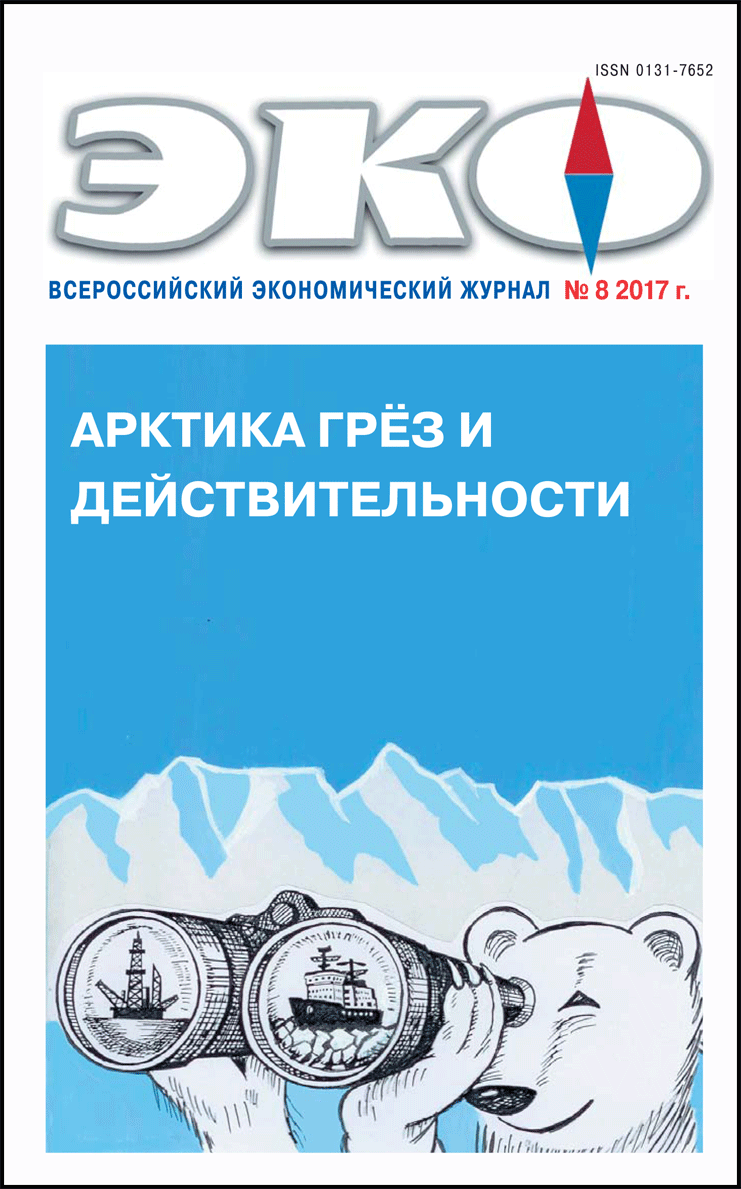COVER STORY: THE ARCTIC OF DREAMS AND REALITY
Published 2019-04-19
Keywords
- ARCTIC,
- SUPPORT ZONES,
- REINDUSTRIALIZATION,
- TERRITORIAL PLANNING,
- CLUSTERS
- OBJECTS OF MANAGEMENT ...More
How to Cite
1.
Andreeva Е. The Supporting Zones in the Arctic: New Orders of the Day in Decision of Old Problems. ECO [Internet]. 2019 Apr. 19 [cited 2025 Nov. 2];47(8):47-60. Available from: https://ecotrends.ru/index.php/eco/article/view/3783
Abstract
Solutions of the large-scale problems of the Russian arctic regions development has to be created considering accumulated problems of the last decades. The search for the most effective forms of adaptation to complex realities are undergoing on all levels from federal and regional to corporate and small business. These forms are based on the new methods of territorial integration and structural interaction of production, science and education along with activation of the social sphere. A new legislative approach is being worked out to create new territorial formations - support zones based on the existing attempts at clusters as powerful nuclei of the future socio- economic development of the Arctic. Although the formation of such support zones can be assessed as a very reasonable approach, one can see the underlying bureaucratization of management, insufficient attention to the Soviet experience of territorial planning and a weak interaction with regional research centers and their methodological designs.References
1.
Дохолян С. Б. Человеческий капитал как условие развития экономики Арктики/C.Б. Дохолян//Современные проблемы использования потенциала морских акваторий и прибрежных зон. Материалы ХI межд. науч. конф. 26 марта 2015 г. -М., 2015 -С. 92-98.
2.
Андреева Е.Н., Соколов В. К. Возможно ли повышение эффективности использования морского побережья России?/Е. Н. Андреева, В. К. Соколов//Теория и практика системных преобразований. Труды ИСА РАН. Т. 11. -М., 2005. С. 150-178.
3.
Андреева Е. Н. Арктическое побережье как стратегический геоэкономический резерв социально-экономического развития РФ/Е.Н. Андреева//Северный морской путь: развитие арктических коммуникаций в глобальной экономике -2015/-Мурманск, МГТУ -С. 99-102.
4.
Андреева Е.Н., Крюков В. А., Спиридонов В. А. Арктическая прибрежная зона: ресурсопользование как основа устойчивого развития региона/Е.Н.Андреева, В. А. Крюков, В. А. Спиридонов//Изменения окружающей среды и климата. Природные процессы в полярных областях Земли. -Т. III. Ч. 2 -ИГ РАН. -М., 2008. -С. 322-334.
5.
Olsen S. B. Framework and indicators for assessing progress in integrated coastal management initiatives/S.B. Olsen//Ocean and coastal management. -2003. -№ 46. -Р. 347-361.
6.
Доронина Ф.Х., Лущик И. В. Развитие морской деятельности как фактор построения новой модели роста национальной экономики/Ф.Х. Доронина, И. В. Лушик//Современные проблемы использования потенциала морских акваторий и прибрежных зон. Мат. ХI Mежд. науч. конф. 26 марта 2015 г. -М., 2015. -С. 77-91.
7.
Стратегия развития морской деятельности Российской Федерации до 2030 года : утв. Распоряжением Правительства Российской Федерации от 8 декабря 2010 г. № 2205-р//КонсультантПлюс . URL: www.cоnsultant.ru (дата обращения: 30.10.2015).
8.
Методические рекомендации по разработке прибрежно-морского компонента Стратегии социально-экономического развития приморского субъекта РФ//Минэкономразвития РФ от 11.10.2013 Д 17 и-904.

